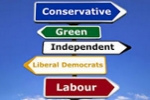If we thought the 2010 election was uncertain, that was nothing compared with 2015. This year we’re not just working out whether the Tories will get a majority, we literally don’t know who will form the next government.
A Labour majority looks pretty unlikely. A Conservative majority is possible as voters start to fear a Labour-SNP pact and the economy continues to improve, but it still looks a difficult mountain to climb.
The government could be any of the following:
- Conservative or Labour majority government
- Large Conservative or Labour minority government (with support from a minor party)
- Conservative – Lib Dem coalition
- Labour – Lib Dem coalition
- Labour – SNP coalition
- Conservative – UKIP coalition
- A three-way coalition
- A Grand Coalition of Labour and the Conservatives

What would this mean for businesses? From the manifestos, a Conservative-led government would take a favourable approach for most private sector employers. The Tories promise the most competitive business taxes of any major economy in the World. Zero hours contracts would be controlled by outlawing exclusivity clauses, but the principal of work ‘as and when required’ would still be allowed. The Conservatives also support a gradual rise in the National Minimum Wage, and promise to fund three million new apprenticeships. They promise a referendum on EU membership following an attempt at renegotiation.
A Labour-led government might not be a disaster for businesses and private sector employment immediately, but corporate tax is likely to increase. Labour plans to spend more than the Tories, so the money would have to come from somewhere. The National Minimum Wage and the cost of paternity leave would also go up. Miliband has promised to outlaw zero hours contracts by forcing companies to make them regular after 12 weeks of regular work. Tribunal fees may be reduced or abolished, and we may see a reduction in the two-year service rule for bringing unfair dismissal claims. Labour generally opposes an EU referendum, but occasionally suggests it might support one for democratic reasons.
The key question may be what impact would the SNP have if they help Miliband into No.10? Most SNP policies are focused on bringing an end to austerity. They would lobby for much higher government spending. Whilst they support a higher ‘Employment Allowance’ to reduce NICs for some employers, they also support a much higher NMW that would likely harm the companies that benefit most from the Allowance. They also want Scottish independence. In the party’s plan for independence, nationalisation featured prominently.
What though would a Grand Coalition of the Conservatives and Labour do for UK businesses? The chances of this happening are slim but not impossible. Some MPs have suggested that it works in Germany and it could keep the minor parties out of government. How long it would last is another matter, and the ‘two parties to choose from’ teaming up could do them more harm than good with UKIP and the SNP already on the rise.
The manifestos have some overlap. They both want to increase employment but have fundamentally different ideas about achieving it. The Conservatives want to take a longer-term approach, saying it will take time to create sustainable full employment with everyone on regular hours and better salaries – but that it is doable. Labour, in opposition at least, have argued that wages and regular hours should already be much higher than they are and that legislation is needed to push them up.
It is very difficult to predict what result we will hear on 8th May. If neither main party gets a majority (or at least a large minority) it will probably negatively impact Britain’s economic progress – and that means that everyone will lose out to some extent.
Russell HR Consulting provides expert knowledge in HR solutions, employment law training and HR tools and resources to businesses across the UK.
Subscribe to our free monthly HR newsletter. Russell HR Consulting employment law newsletters are emailed automatically to our ever-growing number of subscribers every month.
Latest blog posts
- Is There a Santa Clause?
06 / 12 / 2023
- Lend Us a Hand!
22 / 11 / 2023
- What Happens When There is a Clash in Protected Characteristics?
17 / 10 / 2023
- Encouraging a Healthy Workforce 2
21 / 09 / 2023
- Encouraging a Healthy Workforce
23 / 08 / 2023
- What a Disaster - (But We Have a Cunning Plan!)
20 / 07 / 2023
- It’s Time We Stiffened the Sinews
14 / 06 / 2023
- Why Is It So Important to Develop Emotional Resilience?
16 / 05 / 2023
- When is a discretionary bonus not discretionary?
20 / 04 / 2023
- Recovering Training Costs 15 / 03 / 2023
